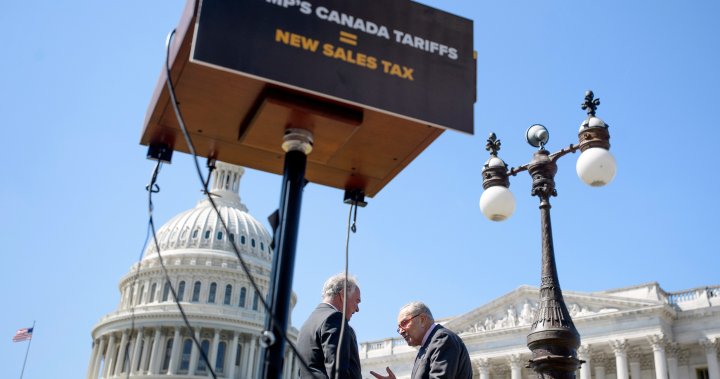The U.S. Senate on Wednesday is set to consider a measure to end the emergency justification used by President Donald Trump to impose sweeping tariffs on Canada — and enough Republicans may vote to ensure the resolution passes.
The vote on the Democratic measure comes as Trump is due to announce his so-called “reciprocal” tariff plan that seeks to reorient global trade, an action the U.S. president has taken to calling “Liberation Day.”
Wednesday is also the day when a temporary exemption on some products from the earlier 25 per cent tariffs on Canadian goods is set to expire. Yet it still wasn’t clear before Trump’s announcement if those tariffs — meant to address what the White House claims is a failure to stop the flow of fentanyl into the U.S. — will return.
Democratic Sen. Tim Kaine of Virginia said his resolution, which has backing from other Democrats and even some Republicans, addresses the fact that Canada is not a top source of fentanyl in the U.S. and that tariffs on Canadian goods will lead to higher prices and economic costs for Americans.
“No one in this chamber … would dispute that fentanyl is a massive problem, and indeed an emergency,” Kaine said on the Senate floor Wednesday ahead of the vote.
“But … calling it a Canadian emergency and putting the same tariffs on Canadian products as we put on Mexican (products) is an invented emergency, not a real emergency.”
The U.S. Intelligence Community’s Annual Threat Assessment report, released last week, does not mention Canada in its section on illicit drugs and fentanyl — an omission Kaine repeatedly highlighted.
A small fraction of the fentanyl that comes into the U.S. enters from Canada. U.S. Customs and Border Protection seized just under 20 kilograms of fentanyl at the northern border during the 2024 fiscal year, and authorities have seized about half a kilogram since January, according to federal data.
Meanwhile, at the southern border, authorities seized over 9,500 kilograms last year.
Get breaking National news
For news impacting Canada and around the world, sign up for breaking news alerts delivered directly to you when they happen.
Kaine said further study of the statistics suggests last year’s seizures may also be an overcount, and included fentanyl encountered in northern U.S. communities like Spokane, Wash., did not cross the border from Canada, but rather originated from Mexico.
Kaine’s resolution seeks to end Trump’s use of the International Economic Emergency Powers Act, also called IEEPA, to declare an emergency over fentanyl trafficking in order to hit Canada with tariffs.
In early March, Trump imposed — and then partially paused — 25 per cent across-the-board tariffs on Canada and Mexico, with a lower 10 per cent levy on energy, and linked the duties to the flow of fentanyl across the border.
Since Trump first threatened those tariffs in November, Canada has made new investments in border security and intelligence and appointed a fentanyl czar to oversee its various strategies to combat the deadly opioid.
Trump last week said Canada and Mexico had “stepped it up,” and on Tuesday said, “we are making progress” on combating fentanyl in a social media post urging Republicans to vote against Kaine’s measure.
Just before 1 a.m. eastern time Wednesday, Trump called out by name the four Republican senators who have publicly voiced support for the resolution — Kentucky Sens. Mitch McConnell and Rand Paul, Alaska Sen. Lisa Murkowski, and Maine Sen. Susan Collins — and urged them to “get on the Republican bandwagon, for a change.”
He claimed Democrats were seeking “to not penalize Canada for the sale, into our Country, of large amounts of Fentanyl, by Tariffing the value of this horrible and deadly drug in order to make it more costly to distribute and buy.”
It wasn’t clear what the president meant when he said he would impose tariffs on fentanyl coming from Canada. Trafficked fentanyl is not being sold legally when it crosses a border, meaning there’s no mechanism like a border guard enforcing duties or an import fee under the legal processes for imports, which is how tariffs are enforced and collected.
Kaine and other Democrats made the argument that tariffs on Canada would ripple through the economy, making it more expensive to build homes and military ships and buy groceries. That argument was echoed by Republicans who supported the measure.
“The tariffs on Canada would be detrimental to many Maine families and our local economies,” Collins said Wednesday.
By contrast, Sen. John Barrasso of Wyoming, a top Republican in the Senate, praised Trump’s tariffs for forcing Canada to take action on border security and said the U.S. faces “unique threats” from the northern border. He claimed, without evidence, that Democrats wanted those enhanced security measures to disappear through the measure.
U.S. Customs and Border Protection data shows monthly encounters at the Canada-U.S. border fell below 500 in February, the lowest number since September 2022.
Other Republican senators spoke about the urgent need to stop the scourge of fentanyl, which has become a top cause of overdose deaths in the U.S. with tens of thousands of Americans killed annually. Only some, however, made the case for tariffs on Canada as a necessary tool to force the country to help that effort.
Even if it gets enough Republican support to pass the Senate, Kaine’s resolution probably won’t stop Trump’s emergency declaration because it’s not likely to come up in the House.
Trump said on social media that “it is not going anywhere because the House will never approve it and I, as your President, will never sign it.”
—With files from the Canadian Press
© 2025 Global News, a division of Corus Entertainment Inc.
4 Republicans back U.S. Senate measure to end Trump’s tariffs on Canada


